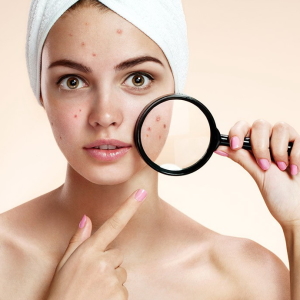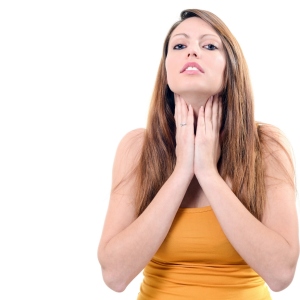Conglobate (or spherical) acne is a serious shape of acne, where deep layers of the skin and subcutaneous fatty tissue are involved in the inflammatory process. Such skin inflammatory defects are not “tied” to the period of puberty and can occur at almost any age, more often in men. Let's look at more details what is conglobate acne and whether it is possible to get rid of them.
The manifestation of conglobate acne
Conglobate acne most often are spherical seals on the skin of red or crimson, sometimes with a bluish tint. Such seals are painful, infiltrated, often filled with pus. A characteristic property of conglomerate acne is that they have a tendency to merge with each other and the formation of groups from inflammatory elements or cysts. Sometimes acne is interconnected by fistulas, which significantly “delays” the healing process. The “favorite” places of such inflammations are face, neck, upper chest and back, stomach. Such features of conglobate acne determine a high risk as a result of improper treatment to obtain cicatricial traces of healing.
Causes of the occurrence of conglobate acne
The disease is based on hormonal imbalance, namely, an increase in the number of male sex hormones in blood plasma, including women (with tumors or polycystic ovary). This, in turn, contributes to the increased production of skin fat and a change in the functioning of epithelium cells. In combination with a bacterial factor, the listed processes lead to the formation of conglomerate acne. “Provocateurs” of such inflammations can be stressful and depressed conditions, chronic infections, hormonal and metabolic disorders, taking medications (steroids, antidepressants, anti -tuberculosis), malnutrition (a large amount of carbohydrates, seafood, iodized salt) or skin care, smoking. , adverse external conditions (dustiness, high or low temperatures, skin pollution, gasoline).
Nutrition correction in the treatment of conglobate acne
One of the components of the treatment complex of this form of acne is the correction of nutrition, which fundamentally does not differ from recommendations for any form of acne. In this case, fatty, sharp and smoked products, easily digestible carbohydrates, which further activate the work of the sebaceous glands fall under the ban. It is not recommended to abuse alcohol, as well as limited to coffee and strong tea. At the same time, the main place in the diet should be distinguished by vegetables, fruits, greens and protein rich products. Vitamins, especially A and E, with mineral components (zinc), also contribute to the healing of the skin.
Local treatment of conglobate acne
As local means, in order to degrease and disinfect the skin in severe forms of acne, alcohol solutions of sulfur, resorcin, salicylic acid and antibiotics can be used. Also, depending on your condition, a specialist can prescribe antibiotics (gentamicin, erythromycin, clindamycin) in the form of an ointment or emulsion, retinoids in the form of a cream or gel.
General treatment of conglobate acne
The “first violin” in the general therapy of this disease today is considered the drug “Roaccutan” related to retinoids. It reduces the activity of the sebaceous glands and has an anti -inflammatory effect. Antibiotics can also be prescribed - tetracycline, doxycycline, kefzole. The drugs are prescribed by a doctor after research on the sensitivity of microorganisms that caused inflammatory processes to antibiotics. In women, hormonal drugs (including oral contraceptives) can be used to restore hormonal balance.
Additional methods for treating conglobate acne
Effective methods of combating heavy forms of acne also included types of therapy such as physiotherapy (electrophoresis with zinc sulfate, antiphagin, ichthyol, iodine solution), autohemotherapy (subcutaneous or intramuscular administration of its own blood), cryotherapy (treatment with liquid nitrogen) , diatermocoagulation (exposure to high-frequency current), laser and oxygen-zone methods of treatment. You can use masks with medicinal mud and body (for acne on the face), baths with sea salt and sulfide baths (for acne on the body).
Considering that conglobate acne is a chronic disease prone to recurrence, their effective treatment should be correct (that is, a prescribed doctor) and aged to the end (courses for taking drugs can be up to 5 months). Only compliance with these two main conditions will make it possible to close as much as possible to complete cure for this form acne.




































